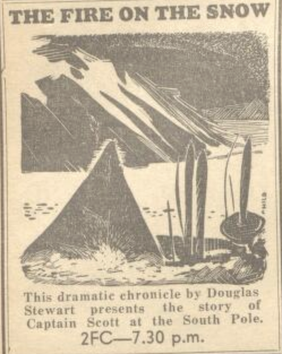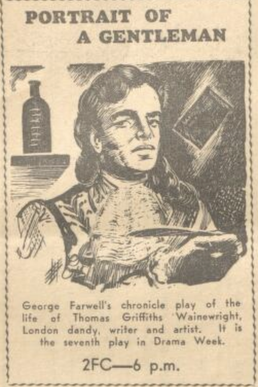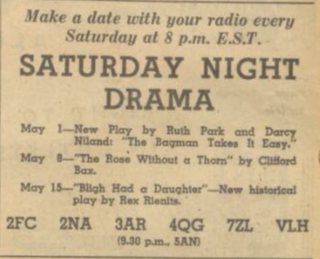Related Research Articles

The Fire on the Snow is a 1941 Australian verse play by Douglas Stewart about the Terra Nova Expedition to Antarctica by Robert Falcon Scott. It premiered on ABC radio on 6 June 1941 to great acclaim and inspired a series of Australian verse dramas on ABC radio.

Lady in Danger was a play by Australian writer Max Afford. It was one of the few Australian plays to be produced on Broadway. It was also adapted for radio and television.

The Invisible Circus is a 1946 Australian stage play by Sumner Locke Elliott set in the world of commercial radio drama, a field that Elliott knew well from many years writing for George Edwards. Elliott is represented in two characters, the idealistic Brad and the more jaded Mark.
The Playwrights' Advisory Board was an Australian organisation established in 1938 to assist the cause of Australian playwriting. It was established by Leslie Rees, Rex Rienits and Doris Fitton. Its functions included negotiating productions with theatres, acting as an intermediary in the nomination and collection of royalties, advising theatres and playwrights on scripts, and holding script competitions. Members of the board included names such as Dymphna Cusack and Sumner Locke Elliott.

Portrait of a Gentleman is a 1940 Australian radio play by George Farwell about Thomas Griffiths Wainewright. It was the first time Wainewright's life had been dramatised.
Stockade is a 1942 radio play by Richard Lane who regarded it as one of his most significant works. It is a verse drama about the Eureka Rebellion. It tells the story though Bridget Shannahan who was on Bakery during the Stockade period. She was a real person, grandmother to Lane's then-wife.
Pirates at the Barn is a 1948 Australian stage play for children. It made its debut in 1948 and was very popular, being performed at the Minerva Theatre in 1949. The cast for that production included Grant Taylor and John Meillion.
We're Going Through is a 1943 radio verse play by T. Inglis Moore about the Australian troops during the Malayan Campaign in World War Two, specifically the battle at Bakri and Parit Sulong.
Hester Siding is a 1937 Australian radio play by Alexander Turner. It was one of Turner's most acclaimed works.
The Man Who Liked Eclairs is a 1945 Australian radio play by Edmund Barclay and Joy Hollyer. It was set in a "small village in England where everyone knows everyone and everyone’s business." The play is one of the better known works from Barclay and Hollyer and a popular Australian play from the time.
Buke and Wills is a 1949 Australian radio play by Colin Thiele about the Burke and Wills expedition.
Captain Swift is a 1888 stage play by Australian author C. Haddon Chambers. It was turned into a 1920 film Captain Swift and adapted for radio. The play was one of the first plays by an Australian with Australian characters to achieve success overseas.
Calcutta in the Morning is a 1948 Australian radio play by Geoffrey Thomas based on his 1947 stage play of the same name.

Bligh Had a Daughter is a 1948 Australia radio play by Rex Rienits about Mary Bligh, daughter of William Bligh, who was living with her father at the time of the Rum Rebellion.
The Earthquake Shakes the Land is an Australian radio play in verse by Douglas Stewart. It concerns the Invasion of the Waikato in the New Zealand Wars. It was a companion piece to Stewart's The Golden Lover.
The Golden Lover is a 1943 Australian verse drama by Douglas Stewart. It was based on an ancient Māori legend. Stewart was from New Zealand.
Gods in Wedlock is a 1942 Australian radio play by Richard Lane. It was one of the few original plays Lane did around this time in his career, as he had switched increasingly to adaptations and serials. Leslie Rees said it was one of Lane's major works and one of the best Australian radio plays of the 1940s.
Far from the Land is a 1947 Australian radio play by Ruth Park. It was very well received on initial broadcast by the public.

Margaret Catchpole is a 1945 Australian radio drama by Rex Rienits about Margaret Catchpole. It was one of several dramatisations of Australian historical figures by Rienits.
Wheat Boat is a 1942 Australian radio play by Alexander Turner. It was bought for the ABC.
References
- ↑ "From The "Scribe's" Book Case". The Mercury . Vol. CLX, no. 23, 018. Tasmania, Australia. 9 September 1944. p. 10. Retrieved 18 October 2023– via National Library of Australia.
- ↑ "Six One-acters", The Bulletin, John Ryan Comic Collection (Specific issues)., 65 (3374), Sydney, N.S.W: John Haynes and J.F. Archibald, 11 Oct 1944, retrieved 18 October 2023– via Trove
- ↑ "Programme Hightlights – What's on This Week", ABC Weekly, 7 (33), Sydney: Australian Broadcasting Commission, 18 August 1945, retrieved 18 October 2023– via Trove
- ↑ "The Week's Plays Over the A.B.C.", ABC Weekly, 12 (16), Sydney: Australian Broadcasting Commission, 22 April 1950, retrieved 18 October 2023– via Trove
- ↑ Rees, Leslie (1953). Towards An Australian Drama. p. 102.